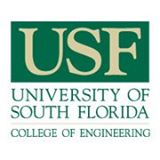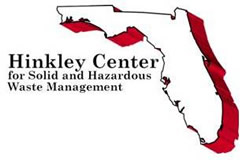Project Title: Cost-Effective Hybrid Constructed Wetlands for Landfill Leachate Reclamation

PIs: Sarina J. Ergas (sergas@usf.edu), and Mauricio Arias (mearias@usf.edu)
Project Description: The dominant landfill leachate management method in Florida is discharge to municipal wastewater treatment plants. However, high concentrations of recalcitrant organic compounds, ammonia and metals in leachate interfere with wastewater treatment processes. Prior studies have shown that sub-surface flow hybrid constructed wetlands (CWs) that combine vertical flow (VF) and horizontal flow (HF) are a cost-effective method for onsite landfill leachate treatment; however, information is limited on the ability of these system to meet reclaim standards for irrigation, industrial, aquifer recharge, surface water augmentation or direct and indirect potable reuse. Recent work by our lab and others suggests that hybrid CW performance can be enhanced by amending the media with low cost adsorbents such as zeolite and biochar. These materials adsorb contaminants such as ammonia and recalcitrant organic compounds, reducing their toxicity to microbes and enhancing biological activity of wetland plants and microbial communities. The goal of this project is to develop cost-effective hybrid CWs for onsite leachate treatment. The specific objectives are to:
- Compare conventional and adsobent amended hybrid CW performance for landfill leachate treatment;
- Develop a numerical process model that can be used to predict the performance of the of the hybrid CWs under varying operational and leachate characteristics; and
- Carry out a preliminary evalutation of post-treatment requirements for reuse applications. Side-by-side pilot scale hybrid CW systems will be operated at Hillsborough County’s Southeast landfill for ~ 6 months.
Experiments will be set up to compare adsorbent amended hybrid CWs with conventional controls. Additional experiments will be carried out to evaluate an adsorbent amended CW as post-treatment for a conventional biological nutrient removal activated sludge process. A numerical process model will be developed and used to predict the performance of the hybrid CWs under varying operational and leachate characteristics. Post-treatment technologies required for reuse applications (e.g., irrigation, industrial and potable reuse) will be identified and assessed.
Technical Advisory Group (TAG) Members and Hinkley Center Staff
Name |
Position/Affiliation |
James S. Bays |
Technology Fellow, Jacobs Engineering |
Kimberly A. Byer |
Solid Waste Management Division Director, Hillsborough County |
Stephanie Bolyard |
Research Engineer, NCDOT Research and Development Office |
William J. Cooper |
Prof. Emeritus, UC Irvine (Courtesy Prof. Environmental Engineering UF) |
Ashley Danley-Thomson |
Assistant Professor, Florida Gulf Coast University |
Viraj deSilva |
Sr. Treatment Process Leader / Freese and Nichols, Inc. |
Scott Knight |
Wetland Solutions, Inc. |
Ashley Evans |
Market Area Engineer, Waste Management, Inc., Florida |
James Flynt |
Chief Engineer, Orange County Utilities Department, Solid Waste Division |
Melissa Madden-Mawhir |
Senior Program Analyst, FDEP |
Marcus Moore |
Facilities Manager, Hillsborough County Water Resources Department |
Luke Mulford |
Senior Professional Engineer, Hillsborough County |
Larry E. Ruiz |
Landfill Operations Manager |
 |
 |